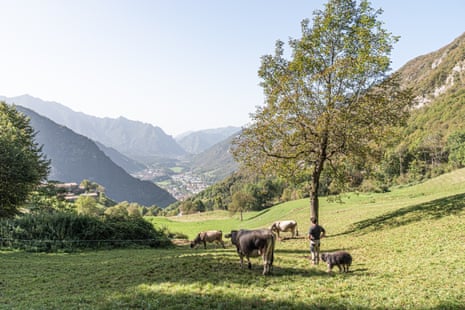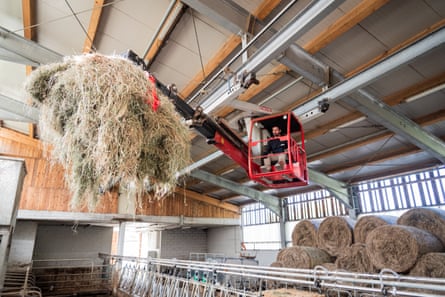When he was 23, Giacomo Perletti came across old photos of the Contrada Bricconi farmhouse in Bergamo, Lombardy, its 15th-century buildings abandoned on the side of a mountain. Despite his youth, and not yet having completed his agricultural studies, Perletti knew immediately he wanted to take it on.
“My desire was guided by a very specific purpose: to give a completely new meaning to the figure of a farmer,” he says.
Perletti says that at the time he felt like an outlier in Italian agriculture: a young man pursuing a modern vision for farming. But now, aged 37 and owner of a thriving business producing cheese, cured meat and vegetables – all used in his Michelin green star restaurant (an award highlighting culinary sustainability) – Perletti is in danger of being considered an old man in his chosen field.
Not only are most of his workforce younger than him, but across Italy an increasing number of young people are taking up work in agriculture.

Over the past decade, businesses led by people under 35 have declined significantly in many sectors – ranging from a 24% decrease in construction to 25% in retail trade, 28% in textiles and 48% in telecommunications.
Agriculture is the only sector in Italy that has seen an increase – albeit of 1% – in businesses led by young people in the past decade, in contrast with the collapse in other industries.
More than 55,000 people under 35 have chosen work in agriculture, from cultivation to livestock farming, agritourism to direct sales, according to the latest data from Coldiretti Giovani Impresa, which represents young farmers.
Last year, an average of 17 new agricultural businesses a day were launched, the organisation says.
“Young people are rediscovering a personal identity in agriculture,” says Enrico Parisi, a national delegate for Coldiretti Giovani Impresa. Agriculture allows many young people to remain in their community instead of leaving for the big cities or going abroad to find opportunities, he says.
Parisi is positive that there will be a further increase in young leaders in the sector in 2024. “We are receiving an increasingly higher number of applications from young people who want to join Coldiretti, either because they will launch their own farmhouse or because they will take over one already set up,” he said. “I therefore expect to see this positive trend in 2024 as well.”
According to Parisi, young Italians are now turning to simple things, like “the blossoming of a peach flower”, to find the happiness they struggle to get elsewhere.
This was the case for Adriano Galizzi. He used to work for an engineering firm in Milan, but as soon as he left the office he would go off to his plot of barbed corn (a local variety from Bergamo province named for its pointy kernels).
“I was the happiest person in the world when picking corn after work,” he says. In 2014, when he was 25, he founded Agrigal in the Lombardy town of Leffe and now grows corn for a living.

Andrea Tagliabue, 33, left his job as a trader in London to reconnect with the land. “I expected the banking sector to be more stimulating,” he says. Instead, the environment was “toxic, stressful and made of nothing tangible”.
“I had a great job, a good base salary plus bonus, yet I wasn’t fulfilled because I felt as if I wasn’t creating anything of value for myself,” Tagliabue says. “I realised the treasure I had left behind when leaving my land.”
During a beekeeping workshop in Vertemate con Minoprio in Lombardy, he discovered the “eighth wonder of the world”: fruit with honey. He went on to found the Banker’s Jam in Brianza, near Lake Como, which produces, among other things, jams and juices flavoured with honey.
According to Perletti, the increasing focus in recent decades on food and the environment explains the growing number of young entrepreneurs going into agriculture.
“The idea that what we eat is important, that the environment is important, that caring for it is important, are almost assumptions in young people’s lives,” he says.
“Farming used to be a profession to avoid, but now it is looked at with respect: if I turn on the TV, four out of 10 programmes are about the environment or agriculture or food,” he adds.
James Lewis Benedetto, an Italian-English 26-year-old, launched a farmhouse offering agritourism in Tuscany last year. “Agricultural work is no longer ridiculed and seen as the renunciation of a career in another field,” says Benedetto.

“The role of the agricultural entrepreneur is increasingly important in society – and respected.”
Benedetto had always wanted to be an entrepreneur, and agriculture was the perfect solution: it allowed him to be close to nature while experimenting and working at something he enjoys on a daily basis.
His farmhouse, Borgo Benedetto, accommodates up to 20 guests, who can enjoy the “slow life” of the Italian countryside, connect with nature and taste the farm’s own olive oil and honey.
According to Roberto Reali, an expert in agriculture and food science at Italy’s National Research Council, the disillusion with other more lucrative jobs has also played a role. There’s a “growing interest in a heritage that was being gradually abandoned,” Reali says.

This is evident in the launch of new specialised degrees across Italy, says Chiara Corbo, director of the Smart Agrifood Observatory of Milan’s Polytechnic University and the University of Brescia.
Perletti remembers that, when he started his degree, there were only about 60 students on his course, but five years later the number had gone up to about 200.
Production generated by workers under 35 is worth about €5 (£4) a hectare, almost twice the European average (young Germans produce about €3), according to data from Coldiretti. Agricultural companies led by those under-35 also drive sales that are 75% higher than the average Italian company.

This younger generation is bringing highly specialised new skills, Reali says, driving major change and improvements to farming. The climate crisis means the predictability of seasons is disappearing, while extreme weather, such as floods and hailstorms, can destroy entire crops. Yet young people are proving particularly adept at dealing with this.
Young people are also more likely to focus on all aspects of their farms, including marketing, innovation, sustainability and direct sales. “There is a completely new atmosphere in the sector,” Reali says.
Despite this, there are still significant challenges for young people who want to get into the industry. The average price of a hectare of land in Italy is €20,900 (about £18,000). Considering that the average size of an Italian agricultural enterprise is 11 hectares, the cost of getting into farming can often be prohibitive.
Yet the investment is well worth it, the young enthusiasts say. “Reviving the Contrada [Bricconi] meant deploying architectural, administrative and agricultural skills … all aimed at re-establishing a fruitful bond between man and nature – a bond that was being lost and which we are slowly recovering,” Perletti says.
“Nature’s calling always wakes up something atavistic within humans. We have something intrinsic that makes us truly appreciate nature.”
